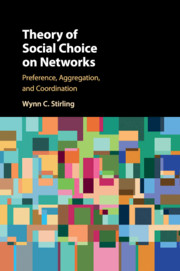Book contents
- Frontmatter
- Dedication
- Contents
- List of Figures
- List of Tables
- Preface and Acknowledgments
- Introduction
- 1 Preference
- 2 Aggregation
- 3 Deliberation
- 4 Coordination
- 5 Randomization
- 6 Satisficing
- Appendix A Dutch Book Theorem
- Appendix B Bayesian Networks
- Appendix C Probability Concepts
- Appendix D Markov Convergence Theorem
- Appendix E Entropy and Mutual Information
- Bibliography
- List of Authors
- Index
Introduction
Published online by Cambridge University Press: 05 September 2016
- Frontmatter
- Dedication
- Contents
- List of Figures
- List of Tables
- Preface and Acknowledgments
- Introduction
- 1 Preference
- 2 Aggregation
- 3 Deliberation
- 4 Coordination
- 5 Randomization
- 6 Satisficing
- Appendix A Dutch Book Theorem
- Appendix B Bayesian Networks
- Appendix C Probability Concepts
- Appendix D Markov Convergence Theorem
- Appendix E Entropy and Mutual Information
- Bibliography
- List of Authors
- Index
Summary
If we want to start new things rather than trying to elaborate and improve old ones, then we cannot escape reflecting on our basic conceptions.
— Hans Primas Chemistry, Quantum Mechanics, and Reductionism (Springer-Verlag, 1981)A social choice arises when a collective of autonomous individuals must choose one and only one element from a set of distinct and mutually exclusive alternatives. The most widely established way to frame this issue is to assume that each individual comes to the social engagement with a fixed linear preference ordering over the set of alternatives that accounts for all issues deemed to be relevant to the individual's welfare. Given this profile of ex ante preference orderings, the social choice problem reduces, essentially, to defining an appropriate aggregation mechanism that produces a rational social choice.
A social influence network comprises a collective whose members are able to influence each other through some direct means of communication or control. When faced with a social choice, the members of such a network may each have preferences over the set of alternatives in terms of individual welfare, but they are also subject to the social influence that others exert on them. As the individuals interact, this influence propagates through the collective, creating a complex social structure as the end result of a deliberative process by which individuals incorporate the influence of others into their own preferences. In such an environment, a set of ex ante preference orderings expressed in terms of individual welfare is not a complete manifestation of the social structure and may even obscure the true nature of the society. This is the nub of the issue. A true characterization of the society requires a comprehensive social model defined in terms of social influence relationships as well as individual welfare, from which a coordinated social choice that incorporates all of the social influence can be deduced.
This book undertakes the task of developing such a model. Unlike many treatments of social choice theory, however, the point of departure is not Arrow's impossibility theorem. Arrow's fundamental hypothesis is that all members of a society come to a social engagement with fully formed preference orderings from which all issues regarding aggregation and the existence of social welfare functions and social choice functions stem.
- Type
- Chapter
- Information
- Theory of Social Choice on NetworksPreference, Aggregation, and Coordination, pp. xix - xxivPublisher: Cambridge University PressPrint publication year: 2016



